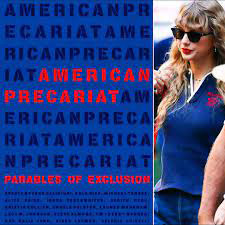We build community because we can’t expect, demand, or control the machinations of the captivity business. Likewise, we can’t be sure that the politics of confinement will provide the spiritual and artistic resources we need to transcend our encagements. These Collectives are our expression of both community and art. They provide our agency. The carceral state will not feed the kind of hunger an artist in these kinds of places experiences. So, we find ways to feed each other. — from “American Precariat”
These words were written by Zeke Caligiuri, one of a dozen incarcerated writers, including some award-winners, who edited “American Precariat: Parables of Exclusion” (Coffee House Press, $19.95), made up of 15 essays by authors not in prison. His foreword traces the growth of writing classes and artists’ communities in the Minnesota prison system, beginning in Stillwater where the first prisoner-produced publications were born. He also writes about the difficulties of communication with his fellow editors who were spread over three prisons in the state, as well as working under conditions over which they had no control, such as an unexplained purge of their computers that wiped out all their writing.

Coffee House Press executive editor Jeremy Davies writes: “(This is) a unique anthology that gives incarcerated writers the distinctive chance to be in a literary position they don’t often have the opportunity to find themselves (which makes) the book a valuable contribution to the conversation about what literature is, who gets to write it, and who it is for.”
The imprisoned editors have worked as an economist, a farmer, a janitor, an activist, a cook, a musician, a wind-turbine laborer, a law student, a Navy vet, a courier, a restoration ecologist, a health aide, a teacher and more. Some have published books and their work has appeared in national publications. They all believe in the power of art to alter society.
About the title: According to the Introduction by Eula Biss, a little over a decade ago the British economist Guy Standing identified a growing class of people he called “the precariat.” Members of this class can’t feel confident in ongoing work, housing, or bodily safety. “Their lives are dominated by uncertainty,” Biss writes. This growing class is not the “working poor,” but rather those who cannot depend on stability, such as people caught in the current gig economy where they must work two and three low-paying jobs to survive.
Among the wide-ranging essays in the book are by Kao Kalia Yang, who writes of her mother’s beauty through the years; Tim “Redd” Warren, recalling trying to paint a portrait of his roommate, considered a nuisance by the prison system after he developed ALS; Michael Torres about the loneliness of Latinx who leave the ‘hood”; and Alice Paige on gender transition and GenderPunk. Together the essays ponder power, social class and the roots of violence.
“American Precariat” will be launched with readings at 7 p.m. Wednesday, Nov. 15, The Hook and Ladder, 3010 Minnehaha Ave, Mpls., with Caligiuri as master of ceremonies. Doors open at 6 p.m. The free program is presented by Coffee House Press in partnership with the Minnesota Prison Writing Workshop.
This post was originally published on this site be sure to check out more of their content.






